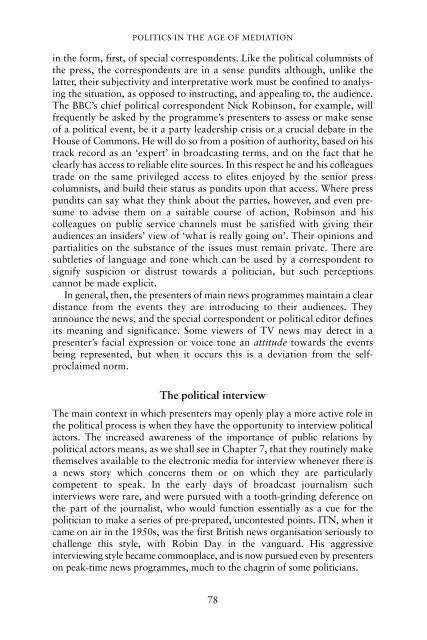20130412164339753295_book_an-introduction-to-political-communication
20130412164339753295_book_an-introduction-to-political-communication
20130412164339753295_book_an-introduction-to-political-communication
You also want an ePaper? Increase the reach of your titles
YUMPU automatically turns print PDFs into web optimized ePapers that Google loves.
POLITICS IN THE AGE OF MEDIATION<br />
in the form, first, of special correspondents. Like the <strong>political</strong> columnists of<br />
the press, the correspondents are in a sense pundits although, unlike the<br />
latter, their subjectivity <strong>an</strong>d interpretative work must be confined <strong>to</strong> <strong>an</strong>alysing<br />
the situation, as opposed <strong>to</strong> instructing, <strong>an</strong>d appealing <strong>to</strong>, the audience.<br />
The BBC’s chief <strong>political</strong> correspondent Nick Robinson, for example, will<br />
frequently be asked by the programme’s presenters <strong>to</strong> assess or make sense<br />
of a <strong>political</strong> event, be it a party leadership crisis or a crucial debate in the<br />
House of Commons. He will do so from a position of authority, based on his<br />
track record as <strong>an</strong> ‘expert’ in broadcasting terms, <strong>an</strong>d on the fact that he<br />
clearly has access <strong>to</strong> reliable elite sources. In this respect he <strong>an</strong>d his colleagues<br />
trade on the same privileged access <strong>to</strong> elites enjoyed by the senior press<br />
columnists, <strong>an</strong>d build their status as pundits upon that access. Where press<br />
pundits c<strong>an</strong> say what they think about the parties, however, <strong>an</strong>d even presume<br />
<strong>to</strong> advise them on a suitable course of action, Robinson <strong>an</strong>d his<br />
colleagues on public service ch<strong>an</strong>nels must be satisfied with giving their<br />
audiences <strong>an</strong> insiders’ view of ‘what is really going on’. Their opinions <strong>an</strong>d<br />
partialities on the subst<strong>an</strong>ce of the issues must remain private. There are<br />
subtleties of l<strong>an</strong>guage <strong>an</strong>d <strong>to</strong>ne which c<strong>an</strong> be used by a correspondent <strong>to</strong><br />
signify suspicion or distrust <strong>to</strong>wards a politici<strong>an</strong>, but such perceptions<br />
c<strong>an</strong>not be made explicit.<br />
In general, then, the presenters of main news programmes maintain a clear<br />
dist<strong>an</strong>ce from the events they are introducing <strong>to</strong> their audiences. They<br />
<strong>an</strong>nounce the news, <strong>an</strong>d the special correspondent or <strong>political</strong> edi<strong>to</strong>r defines<br />
its me<strong>an</strong>ing <strong>an</strong>d signific<strong>an</strong>ce. Some viewers of TV news may detect in a<br />
presenter’s facial expression or voice <strong>to</strong>ne <strong>an</strong> attitude <strong>to</strong>wards the events<br />
being represented, but when it occurs this is a deviation from the selfproclaimed<br />
norm.<br />
The <strong>political</strong> interview<br />
The main context in which presenters may openly play a more active role in<br />
the <strong>political</strong> process is when they have the opportunity <strong>to</strong> interview <strong>political</strong><br />
ac<strong>to</strong>rs. The increased awareness of the import<strong>an</strong>ce of public relations by<br />
<strong>political</strong> ac<strong>to</strong>rs me<strong>an</strong>s, as we shall see in Chapter 7, that they routinely make<br />
themselves available <strong>to</strong> the electronic media for interview whenever there is<br />
a news s<strong>to</strong>ry which concerns them or on which they are particularly<br />
competent <strong>to</strong> speak. In the early days of broadcast journalism such<br />
interviews were rare, <strong>an</strong>d were pursued with a <strong>to</strong>oth-grinding deference on<br />
the part of the journalist, who would function essentially as a cue for the<br />
politici<strong>an</strong> <strong>to</strong> make a series of pre-prepared, uncontested points. ITN, when it<br />
came on air in the 1950s, was the first British news org<strong>an</strong>isation seriously <strong>to</strong><br />
challenge this style, with Robin Day in the v<strong>an</strong>guard. His aggressive<br />
interviewing style became commonplace, <strong>an</strong>d is now pursued even by presenters<br />
on peak-time news programmes, much <strong>to</strong> the chagrin of some politici<strong>an</strong>s.<br />
78
















